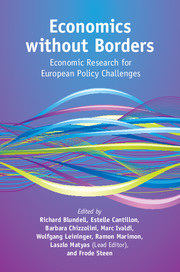Book contents
- Frontmatter
- Contents
- List of Figures
- List of Tables
- Foreword
- Contributors
- Introduction
- 1 Innovation and Growth: The Schumpeterian Perspective
- 2 European Union Dual Labour Markets: Consequences and Potential Reforms
- 3 Population, Migration, Ageing and Health: A Survey
- 4 Education Systems: Assignment, Admissions, Accountability and Autonomy
- 5 Competition and Regulation in Markets for Goods and Services: A Survey with Emphasis on Digital Markets
- 6 Winners and Losers of Globalization: Sixteen Challenges for Measurement and Theory
- 7 Economic Approaches to Energy, Environment and Sustainability
- 8 Regional Disparities and Efficient Transport Policies
- 9 Skilled Cities and Efficient Urban Transport
- 10 Fiscal and Monetary Policies after the Crises
- 11 Financial Regulation in Europe: Foundations and Challenges
- 12 Inequality and Welfare: Is Europe Special?
- 13 Developments in Data for Economic Research
- 14 Big Data in Economics: Evolution or Revolution?
- Index
Foreword
Published online by Cambridge University Press: 24 March 2017
- Frontmatter
- Contents
- List of Figures
- List of Tables
- Foreword
- Contributors
- Introduction
- 1 Innovation and Growth: The Schumpeterian Perspective
- 2 European Union Dual Labour Markets: Consequences and Potential Reforms
- 3 Population, Migration, Ageing and Health: A Survey
- 4 Education Systems: Assignment, Admissions, Accountability and Autonomy
- 5 Competition and Regulation in Markets for Goods and Services: A Survey with Emphasis on Digital Markets
- 6 Winners and Losers of Globalization: Sixteen Challenges for Measurement and Theory
- 7 Economic Approaches to Energy, Environment and Sustainability
- 8 Regional Disparities and Efficient Transport Policies
- 9 Skilled Cities and Efficient Urban Transport
- 10 Fiscal and Monetary Policies after the Crises
- 11 Financial Regulation in Europe: Foundations and Challenges
- 12 Inequality and Welfare: Is Europe Special?
- 13 Developments in Data for Economic Research
- 14 Big Data in Economics: Evolution or Revolution?
- Index
Summary
As the Chair of the Scientific Advisory Committee of the Cooperation on European Research in Economics (COEURE) project, I am pleased to present to the public this comprehensive and enlightening volume. The aim of the COEURE initiative is to take stock of current economics research and formulate an agenda for research funding in the field in Europe. From this point of view, the surveys collected in this book are written by top European economists who are intellectual leaders in their respective fields. These surveys identify both research areas that are particularly promising and their potential impact on policy in the European context.
European economics has made significant progress in recent decades. Before the late 1980s, European economics was very fragmented with very little interaction across national borders. Research was mostly published in national languages with very little communication and cross-country fertilization. However, a number of changes have taken place over the last 30 years. First of all, European-wide networks have started to develop. The European Economic Association was created in 1985 and has organized an annual Congress every year since then, partly in coordination with the Econometric Society. The Centre for Economic Policy Research (CEPR), founded by Richard Portes on the model of the US NBER, played a pioneering role in creating the first Europeanwide high-quality economic research network in Europe. It started selecting outstanding young researchers as Fellows and Affiliates, disseminating their work, organizing European-wide workshops and attracting some of the best US economists to them. Its emphasis on the policy relevance of research has been particularly important and has helped elevate the intellectual debate on all aspects of European integration. The most prominent economists of my generation acknowledge the key role played by the CEPR since the late 1980s and 1990s in internationalizing European economics. Several other cutting-edge European-wide networks have been created since. A good example is the Institute for the Study of Labor (IZA) in Bonn, led with great success by Klaus Zimmerman for the last 20 years. IZA has been very good at recruiting eminent young applied economists, partly because their horizon is not restricted to Europe.
- Type
- Chapter
- Information
- Economics without BordersEconomic Research for European Policy Challenges, pp. xix - xxiiPublisher: Cambridge University PressPrint publication year: 2017
- Creative Commons
- This content is Open Access and distributed under the terms of the Creative Commons Attribution licence CC-BY-NC-ND 4.0 https://creativecommons.org/cclicenses/



